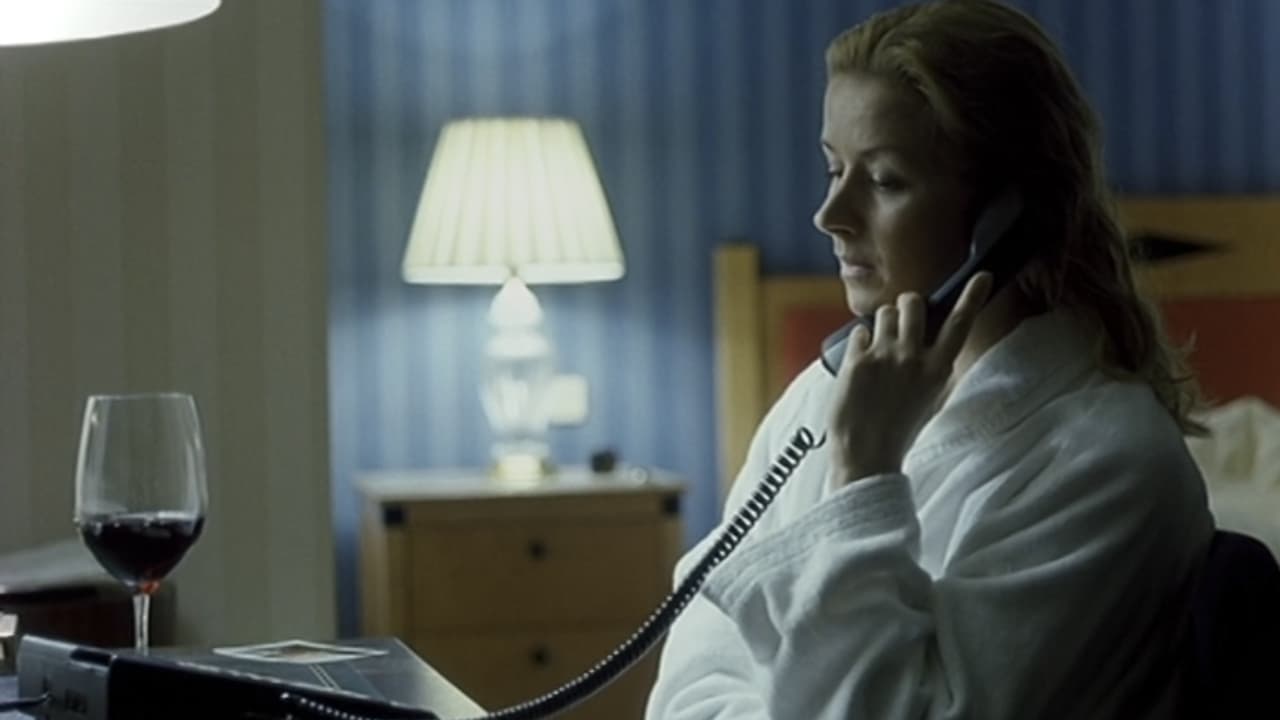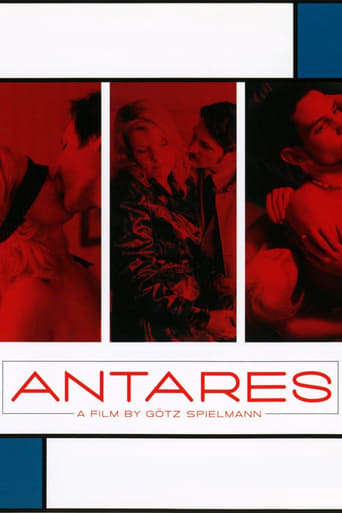

The interlocking sexual relationships here find their unifying metaphor in a minor incident shown in long shot, without emphasis. A man trains his dog to fetch, to heel, to leap up and wrestle for a stick. The man's relationship with his dog replays the issues of control in the three human stories. But the human relationships are all complicated by the power of sexuality. That's why — as the old man with a mysterious disease remarks — people make fools of themselves.The nurse's husband finds his passion in classical music. So she's ripe for a wild affair with a traveling salesman, where they experiment with blindfolding, exhibitionism and an increasingly daring pleasure. Both lovers are overwhelmed by heir sexual connection; they hardly speak. The lover's pleasure in his erotic photos of her contrasts to her husband's walls of classical CDs. They are symptomatically different collectors. His control threatened, the husband erupts when her ostensible night duty interrupts their planned concert, then when a real estate agent stands them up. Their young teen daughter has her own music, to which she practices sultry dancing, exploring her approaching womanhood. The young blonde cashier exercises a different power, faking pregnancy to win her Yugoslavian boyfriend's commitment to marry her. Her fits of anger and jealousy appear to bring him to heel. In fact, he walks her dog as a way to meet his more amenable mistress. But the girl is more damaged and controlled by her moods than her fiancé is, even if he does return after her suicide attempt. His mistress is herself struggling to remain free from her violent, obsessive ex. Swaggering, boastful, pleading love and claiming superior understanding, the real estate agent forces himself on her and punches out his rival. Mercifully, he kills himself in the traffic accident that pulls the separate stories together. He's destroyed by his delusions of manly power, as the blonde is by her manipulative moods that damage her more than her guy. Only the nurse succeeds because — as a healer — she has found what she needs to live fully and follows her prescription. Like her dancing daughter, the nurse uses her sexuality to fulfil herself. The stories are set in an ugly dense housing complex in Vienna. All the stories of animal vitality and the struggle for control play against that dehumanizing setting. Indeed the classical music fan wants to move out, perturbed by the genital graffiti on the elevator walls. His wife finds at least an emotional escape. The violence in all three stories is limned in the title, which suggests the anti-Ares, the opposition to the god of war, the passion of sex and love, which can be as destructive yet more fulfilling. Beats having an obedient dog.
... View MoreAntares is one fine example how the accomplished director Götz Spielmann could weave the delicate cobwebs of the intricacies of human emotions so beautifully on the screen. Spielmann possesses the distinct way of story-telling which doesn't require flamboyant camera-tricks or racy scenes to spice up his story. There the characters evolve slowly and steadily but give you opportunity to learn a thing or two about the complexity of human nature. In Antares, the story loosely follows the lives of three women, crossing one another's paths couple of times. One has a fine family and job yet indulges into passionate affair with a secret taciturn lover. Another desperately wants to get married with her boyfriend, but is very insecure about him. While the third one trying hard to get rid of her violent and abusive ex-husband who could yell at her, beat her but couldn't stop seeing her! But in all stories the core theme is passion and ambiguity of human nature. Here the characters are provided with two options of more, but it's never so simple to choose one of them! Antares tries to explore the complexities of relationships and hence the lives of variety of people trapped into their own emotional webs, the urban way of living has to offer! Antares is all about the unflinching passion and endless yearning inherent to human nature. the director manages to stitch the three parallel stories seamlessly and the characters are left echoing in viewer's mind for long after the movie is finished.
... View MoreThis film tells three intertwined stories of the residents of an apartment building. This style of filmmaking has become popular of late, following the early success of Robert Altman ("Nashville" and "Short Cuts") and Alejandro Inarritu ("Amores Perros" and "Babel"). This one, however, falls far short of those films. Of the three episodes, the first one is the most interesting, featuring a nurse in a loveless marriage having a brief affair. The other two episodes concern low-lifes making each other's lives miserable. Neither the characters nor the stories are particularly interesting. Of course everything comes together in a predictable finish.
... View MoreAntares gets its name from the ancient Greeks and means Anti-Ares. Ares is, of course, the God of War, also called Mars by the Romans. Antares is linked to the planet Mars because they are both about the same colour and brightness, so it is easy to get them confused. The official site tells us, "The film comprises three interconnected stories that are in a sense three 'Scorpio stories' with intense emotions, both positive and negative: sex, jealousy, violence, crisis and death." If you bear that in mind, it will give you a clue to the substance of this finely observed film, but the movie hooked me before I knew that, making fine comparisons that easily confound moral judgement.Antares begins with a car crash (one that takes us quite unawares) and continues an intense pace for the first third of the movie, including explicit sex scenes. But the first story is that of Eva, a nurse, wife and mother. She becomes involved in an intensely passionate affair. The second story concerns a check-out girl, obsessively jealous of her partner who pastes billboards for a living, and lying to him to ensure his 'love'. The final story concerns a divorced couple where the man will not let go and the wife has started seeing someone else. The three stories fully intertwine only at the end.Each story involves a couple and a third party, none are 'whiter than white'. But there are important differences, not least in how we view and judge them. Using 'truth' as a yardstick gets us nowhere as none of them are particularly honest although the most violent person (the abusive husband of the last story) is probably the least dishonest. In the first couple (a white collar family, listening to Schubert, raising a teenage daughter with love and care), we somehow feel that the infidelity is less 'wrong' than in the later example. It might even be the safety valve, without which the couple (who communicate politely but not very effectively) would have reached breaking point, hurting everyone but especially the child. In the second example, both partners are trying to control the other and we instinctively feel they are more selfish and less sympathetic. A yardstick becomes, who is hurt? What was the intention to hurt or nurture? Their motives to each other seem shallower, their methods more devious, they are less likable. They are also less interesting given that this film will appeal to a highbrow audience, do we judge them worse because they are poor and less intelligent? But then we see the third scenario a brutal, dangerous husband. Can the wife be blamed that she has 'moved on'? the husband is externally convincing, but we learn he has raped and beaten her and she is in fear of him. His 'reality' is a different one to hers. Compared to the billboard-poster, who seemed such a reprobate a minute ago, he is a monster.Notice how our perceptions and judgements of the characters are altered as well by the use of nudity in different ways, by the use of humour (a person seems less 'bad' when they are funny, irrespective of the facts), and by our comparisons with 'better' and 'worse' individuals. Trying to make moral judgements becomes a very confusing affair, but most people will be able to distinguish between the non-violent and almost loving deception of the first couple compared to the violent triangle of the last story. The effective attempt to 'do the right thing' in spite of overriding passions manifests itself differently.If you found movies like Closer intriguing as a moral primer, take Antares on for a more difficult conundrum. It takes someone of considerable skill to weave such a tapestry effectively, and Götz Spielmann distinguishes himself in Antares as a director of profound insight, considerable talent and great artistic integrity.
... View More